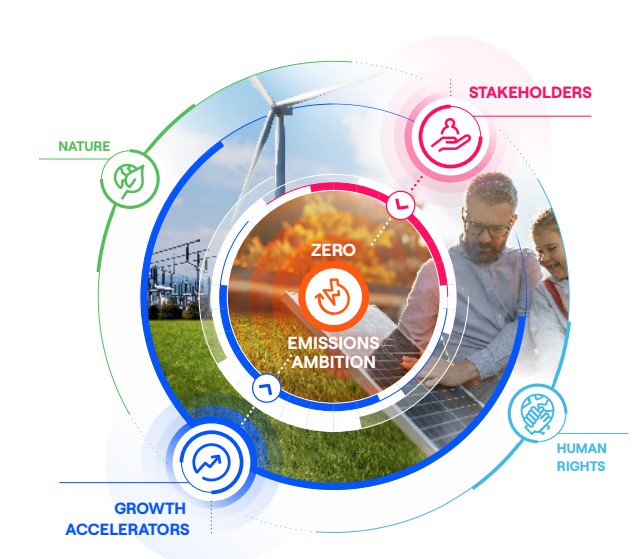
Net Zero Ambition
Includes actions of the business model aligned with the goal of not exceeding a temperature increase of 1.5 degrees Celsius compared to pre-industrial levels. For this ambitious goal, the Company does not offset emissions, relying on the decarbonization process of the generation matrix, thanks to new renewable capacity and the hybridization of renewables with storage solutions.
Clean Electrification
Enel Chile is committed to the electrification of energy uses in which people, with their daily choices, are protagonists in the adoption of cleaner energy. Strategic actions, supported by a digitized platform capable of managing a large customer base, will create value by reducing the energy expenditure and carbon footprint of its customers, significantly and tangibly improving the quality of life of all.
People
The relationships that the Company establishes with its stakeholders are at the heart of its commitment, whether they are employees, suppliers, community members or customers. In response to their needs, this translates into attention to those most exposed in the transition to a decarbonized economy, with special attention to their requalification and reconversion to support the creation of a more resilient ecosystem. For people working in Enel Chile and its subsidiaries, the Company is also committed to promoting a diverse and inclusive environment by encouraging the development and strengthening of skills. Establishing responsible relationships with the communities in which the Company operates is part of the strategy, which allows promoting social and economic development. Within the supply chain, we are increasing our commitment to sustainability by incorporating environmental, social and governance requirements.
Nature
The challenge posed by climate change is the strongest obstacle for people. The protection of the environment and natural resources, the fight against climate change and the contribution to sustainable economic development are strategic factors in the planning, operation and development of the activities of Enel Chile and its subsidiaries. Together with decarbonization, environmental sustainability is a daily commitment to the conservation and preservation of nature and biodiversity, reducing and mitigating the possible negative effects on the planet derived from the activities of Enel Chile and its subsidiaries.
Growth Accelerators
These are fundamental tools to increase and broaden the range of action to achieve the Company's objectives, encompassing and strengthening all the themes of the sustainability strategy. Innovation facilitates the integration of sustainability in all aspects of the business, playing a central role that allows us to respond to the needs of our stakeholders, amplifying the scope of the impacts of our strategy. Another theme related to the challenges of the business model is the circular economy, an accelerator that reduces the consumption of materials throughout the value chain, and the development of circular business models and new solutions such as exchange platforms. The key strategy to strengthen is cybersecurity, the basis of digital transformation, necessary to increase resilience and digital supports, platforms and tools that make the daily activities of those who work in the company more sustainable.
Sustainability fundamentals
At the core of the Company's strategy to contribute to sustainable progress is a commitment to respect human rights throughout the value chain, including the well-being, health and safety of people. Sound governance is the foundation for sustainable success and is intrinsically linked to a corporate governance structure that incorporates ESG aspects into key corporate decision-making processes.

